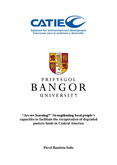Mostrar el registro sencillo del ítem
Are we learning? Strengthening local people's capacities to facilitate the recuperation of degraded pasture lands in Central America
| dc.contributor.author | Bautista Solís, Pável | |
| dc.date.accessioned | 2014-10-20T04:12:12Z | |
| dc.date.available | 2014-10-20T04:12:12Z | |
| dc.date.issued | 2012 | es_ES |
| dc.identifier.uri | https://repositorio.catie.ac.cr/handle/11554/4516 | |
| dc.description | Tesis (Doctorado) -- CATIE. Escuela de Posgrado, Turrialba (Costa Rica), Bangor University (BU), 2012 | es_ES |
| dc.description.abstract | Esta tesis describe y evalúa el impacto de un proceso participativo de aprendizaje y experimentación, basado en el enfoque de Escuelas de Campo (FFS) para ganaderos en Centro América. Organizaciones han dedicado esfuerzos para generar mejoras tecnológicas en la Producción ganadera como la implementación de sistemas silvopastoriles (SPS) y prácticas intensivas como silos y heno. Sin embargo, a pesar de la inversión material en investigación y extensión para promover su uso, la adopción de dichas tecnologías permanece limitada. Por ende, los medios de vida y la sostenibilidad ambiental de la Producción ganadera son comprometidos, causando efectos negativos como la contaminación de fuentes de agua, degradación de pasturas-suelos y pobreza.El análisis demostró que son necesarios más esfuerzos para facilitar la implementación de sistemas de Producción ganadera sostenibles. Estos pueden incluir el fortalecimiento de bienes que usualmente no son considerados en proyectos de desarrollo agroforestal o rural: los capitales social y político. Además, es necesaria la búsqueda de estrategias para un ambiente de políticas favorable mecanismos para el financiamiento de FFS y el establecimiento de mejores prácticas. This thesis describes and assesses the impact of a participatory learning and experimentation process based on the livestock Farmer Field Schools (FFS) approach in Central America. Several organizations have devoted efforts to generating technological improvements for livestock production, such as the implementation of silvopastoral systeMON (SPS) and intensive livestock practices including silage and hay. However, despite material investments in research and extension for promoting their use, the adoption of those technologies remains limited. In consequence, the livelihoods of farmers and the environmental sustainability of cattle production are compromised, causing negative effects such as contamination of water, degradation of pastures and soils, and poverty. Analyses showed that further efforts for facilitating the implementation of sustainable livestock production systeMON are needed. The latter should include the strengthening of assets that have not usually been addressed in agroforestry and rural development projects: namely social and political capitals. Moreover, a search of strategies for creating a supportive policy environment and mechanisMON for funding FFS and the establishment of better practices are also necessary. | es_ES |
| dc.language.iso | en | es_ES |
| dc.publisher | CATIE, Turrialba (Costa Rica) Bangor University (RU) | es_ES |
| dc.relation.ispartof | Programa Agroambiental Mesoamericano (MAP). Fase I | |
| dc.rights | info:eu-repo/semantics/openAccess | |
| dc.subject | AMERICA CENTRAL | |
| dc.subject | TIERRAS DE PASTOREO | es_ES |
| dc.subject | DEGRADACION DE TIERRAS | es_ES |
| dc.subject | PRODUCCION ANIMAL | es_ES |
| dc.subject | EXPLOTACIONES AGRARIAS | es_ES |
| dc.subject | SISTEMAS SILVOPASCICOLAS | es_ES |
| dc.subject | INNOVACION | es_ES |
| dc.subject | PARTICIPACION COMUNITARIA | es_ES |
| dc.title | Are we learning? Strengthening local people's capacities to facilitate the recuperation of degraded pasture lands in Central America | es_ES |
| dc.type | Tesis | es_ES |
| dc.identifier.publication | Turrialba (Costa Rica) | es_ES |
Ficheros en el ítem
Este ítem aparece en la(s) siguiente(s) colección(ones)
-
Publicaciones y documentos [4421]


